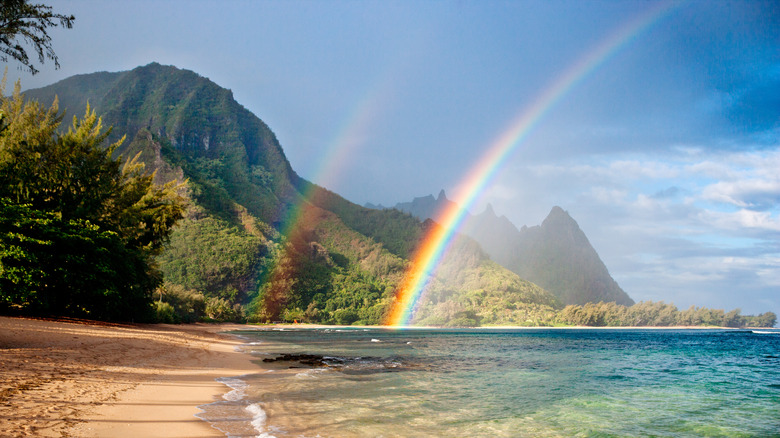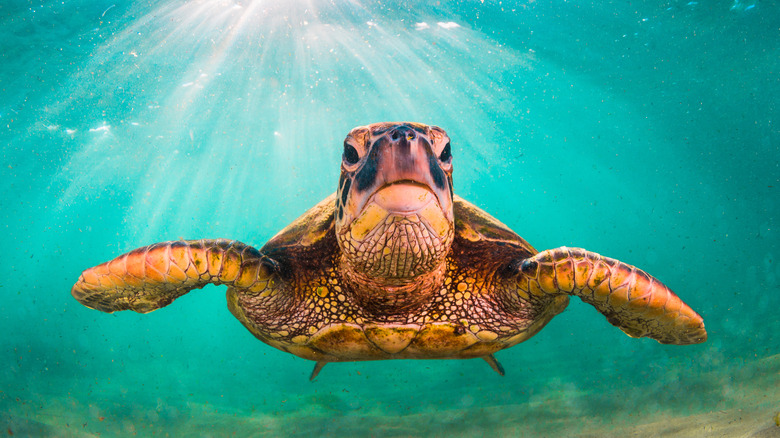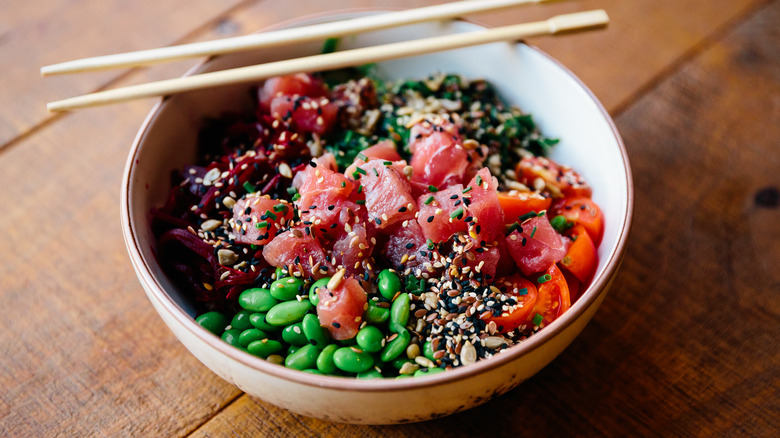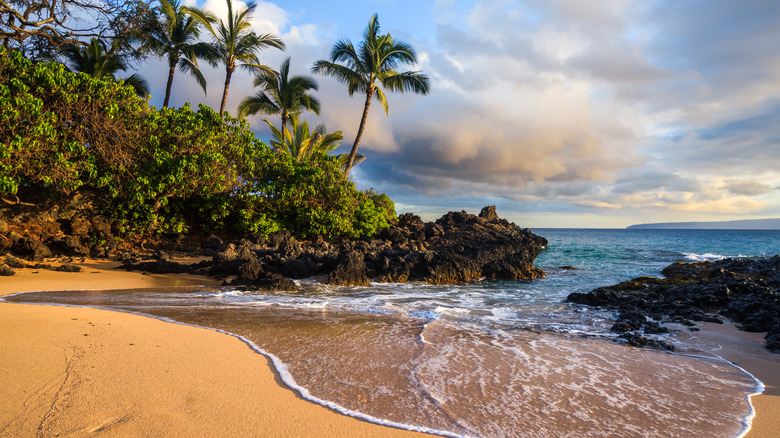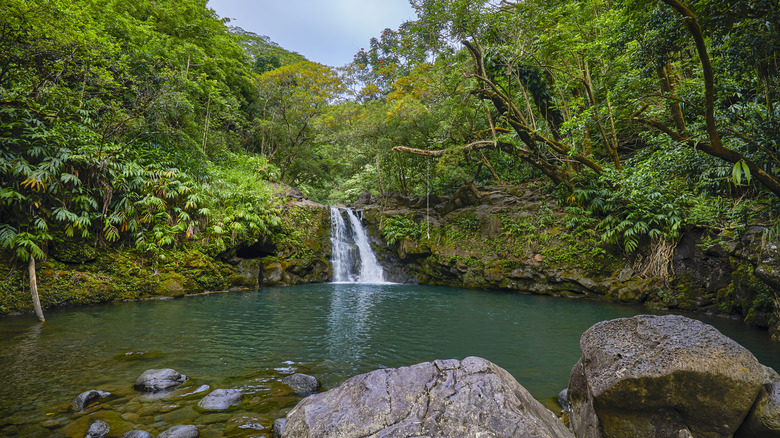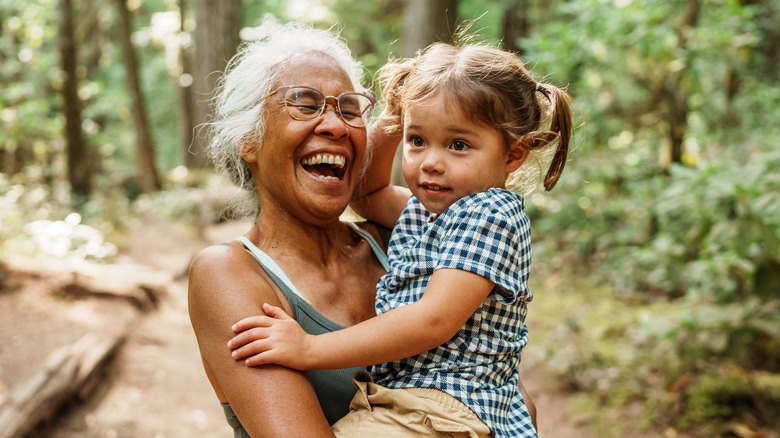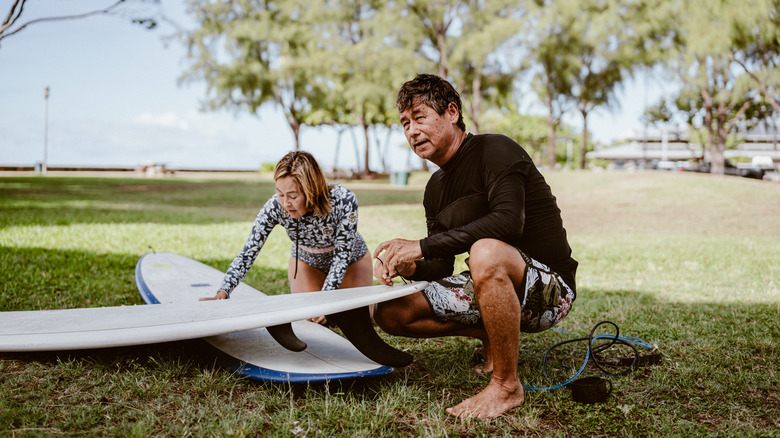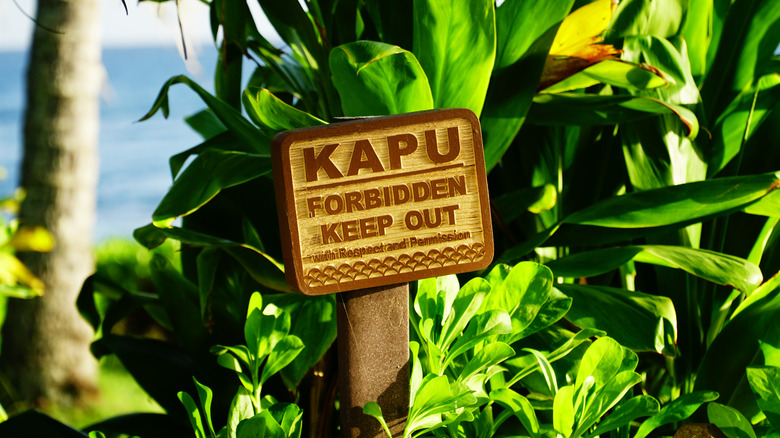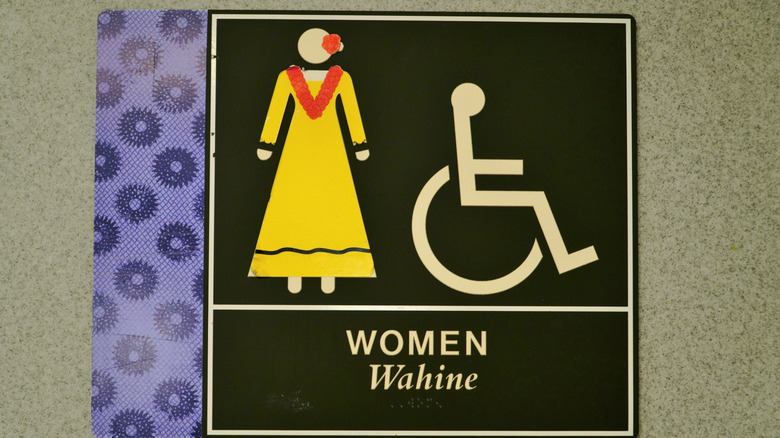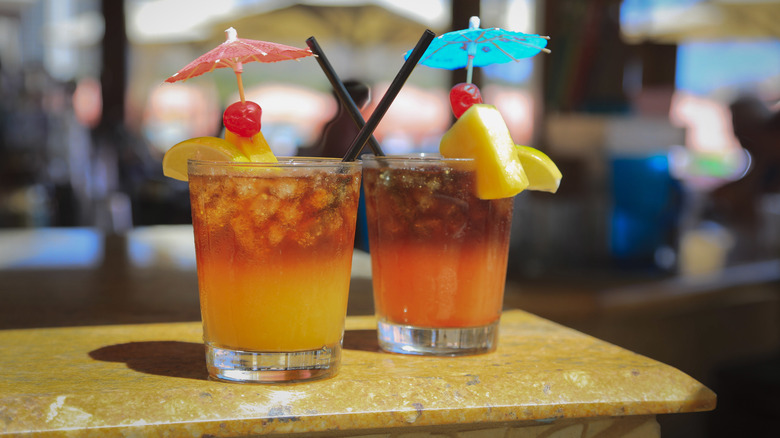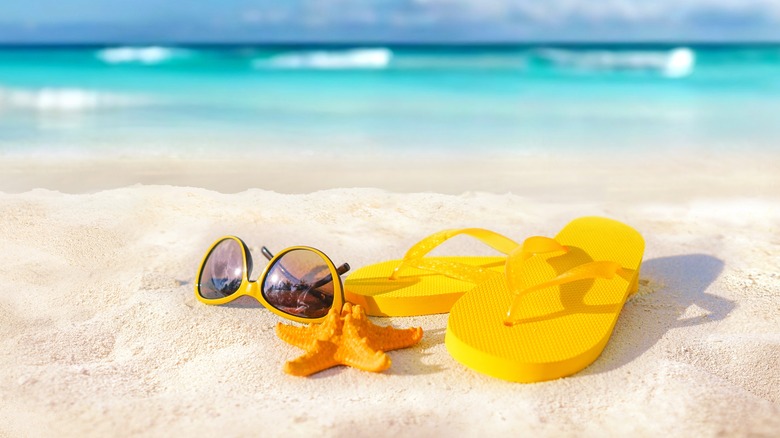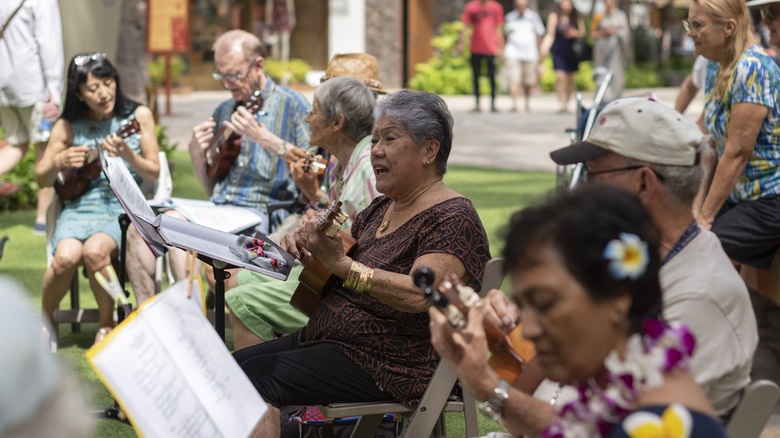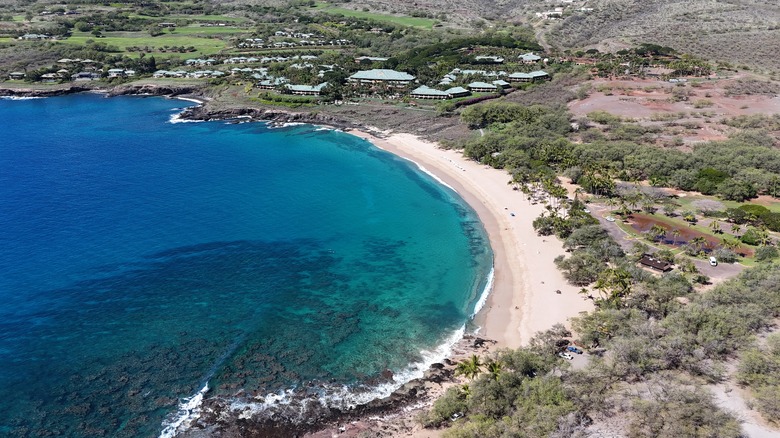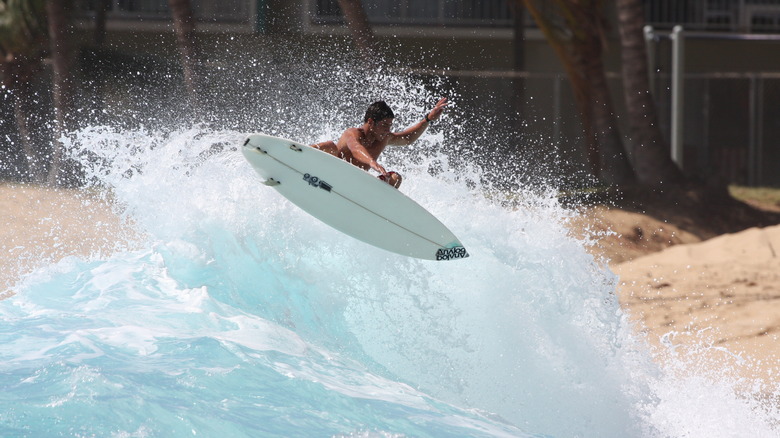Common Slang And Phrases Tourists Should Really Know Before A Vacation To Hawaii
Hawaii is a popular holiday destination packed with remarkable attractions. However, before you board a plane to the Aloha State, you should be aware of several words and phrases within the Hawaiian language. While "Aloha" is a pretty universal term, it barely scratches the surface regarding the 'Ōlelo Hawai'i — the official term for the indigenous Hawaiian language. 'Ōlelo Hawai'i is recognized as the official language of the islands (along with English) and is an important part of connecting the present with Hawaii's Polynesian roots.
Hawaiians have consistently fought to preserve their ancient language, as the United States banned speaking it in 1896. It would be nearly a century before the native Hawaiian language would be reintroduced into the education system and recognized as an official language. Since then, native Hawaiians have been playing catch up — teaching 'Ōlelo Hawai'i in public schools and launching programs to preserve and protect the indigenous language for future generations.
Tourists traveling to the islands should be aware that respecting the "'Āina" (the Hawaiian word for "land") means opening one's mind, body, and soul to the culture and tradition permeating throughout the Hawaiian Islands. Knowing some important words and phrases in the 'Ōlelo Hawai'i language shows respect for Hawaiians and their land, which is considered sacred. That might sound daunting, but fear not — we're breaking down a guide to some everyday slang and frequent phrases tourists should know before heading to paradise.
Give thanks with the word 'mahalo'
One essential word to know before visiting Hawaii is "mahalo" (pronounced like mah-hah-loh), the Hawaiian word for thank you. "Mahalo" is used as a way to show gratitude, respect, or admiration for something someone has given to or done for you. Tourists can use it as often as they'd like, whether they're making purchases or thanking a server, but Hawaiian visitors should know that "Mahalo" has a more profound meaning than "thank you" alone — it's also used as an all-encompassing appreciation for one's surroundings or the people close to them.
"Mahalo" is derived from the Proto-Polynesian word "Masalo," and was introduced into Hawaiian culture only after the native people came into contact with Western civilization. The earliest record of the word "mahalo" being used was in the 1890s when a New York journalist recorded hearing it being used in a transaction. Before then, ancient Hawaiians had no word for "thank you," as gratitude was deeply rooted in the culture and didn't need to be expressed in words.
'A hui hou' is another way to say goodbye
To say "goodbye" in Hawaii is to say "a hui hou," a phrase tourists will most likely hear often during their trip to the Hawaiian Islands. "A hui hou" (pronunciation ah-hoo-wee ho) translates to "until we meet again" and is another way of saying see you soon. Saying goodbye in Hawaii is packed with superstition, as Hawaiians traditionally avoid implying that they may never see friends or loved ones again. "A hui hou" avoids that finality and is a way of parting ways while alluding to a future reunion.
"A hui hou" is also an important part of funeral traditions for Hawaiians. Family is incredibly significant to the Hawaiian people, and is universally considered the foundation of their culture. Because of this, when parting ways or paying respects at funerals, Hawaiians use "a hui hou" to express that they will be reunited with their loved ones in the afterlife.
'Honu' refers to the Hawaiian green sea turtle
If you're lucky enough during your visit to the Hawaiian Islands, you might come across a "honu" (pronounced like hoe-new) — a Hawaiian green sea turtle. As Hawaii's most spotted sea turtle species, these marine reptiles are commonly spotted sunbathing at Laniakea Beach on Oahu or at Ho'okipa Beach Park, one of the best beaches on Maui. Honu are immensely revered and respected in Hawaiian culture, and the term itself dates back to ancient Hawaiian petroglyphs. Legend has it that Hawaiian hero 'Ai'ai drew a honu by making marks onto a rock near the ocean, and these animals are thought to be the eternal link between humans, land, and the sea.
Because of their long life span (some turtles live up to 80 years), honu symbolize longevity, security, and good fortune. The honu also represent "mana," which is the term for spiritual energy in the Hawaiian language. These Hawaiian green sea turtles go hand in hand with the "'aumakua" or "ancestor gods," and are thought to be a form of ancestral spirit that helps to guide and protect the native Hawaiian people.
'Ono Grinds' is the perfect phrase for serious foodies
For tourists interested in trying all the incredible local food the Hawaiian Islands offer, "'ono grinds" (pronounced oh-no grinds) is a commonly used term meaning delicious food. The phrase is an everyday slang word from Hawaiian pidgin, which originated on the islands as early as the 1800s. Hawaiian pidgin has its roots in sugarcane plantations and was born out of a need for Japanese, Chinese, Portuguese, and English workers to be able to communicate.
"'Ono grinds" can be used separately or together — "'ono" describes something especially tasty, and "grinds" means food or a meal. Tourists may see the word "ono" used without the 'okina mark, which is sometimes referred to as a reverse apostrophe but officially known as a consonant in the Hawaiian language. The word "ono" without the 'okina means a mackerel-like fish commonly served on Hawaiian menus.
'Ohana' was used long before Lilo & Stitch made it famous
You may have heard the term "'ohana" (pronounced oh-ha-nah) used in Disney's "Lilo & Stitch." The word means family in Hawaiian, and it also signifies that no member of one's "'ohana,"— blood relatives or chosen family — gets left behind. In Hawaiian culture, family is of utmost importance, and families often live together in multi-generational homes. Tourists may meet Hawaiians residing with their "'ohana," or parents and grandparents under the same roof.
The word "'ohana" stems from the Hawaiian word for "'oha," the stalk of a Taro plant. These root vegetables were introduced by Polynesians centuries ago and remain a huge part of Hawaiian culture. The Hawaiian term "ana" means procreation, and "'ohana" carries the significance of planning for future generations.
'Shoots' is a way of agreeing
Another term tourists might hear often in Hawaii is "shoots." The word is used as a term of agreement or instead of the word "okay." The term comes from Hawaiian Pidgin and is another way of expressing, "sounds good; let's do it."
"Shoots" can also be used in the form of a question. Hawaiians may use the term to confirm plans or say something like, "Let's grab some 'ono grinds, shoots?" Whatever the occasion, the word is often accompanied by an iconic Hawaiian Shaka sign (dictated in the photo above), which loosely means "right on" and is thought to be the ultimate hand gesture showing the Aloha Spirit.
Respect the ''āina'
An essential word in the Hawaiian language is "'āina," which means land. Hawaiians treat their environment and surroundings with devotion, as they are another sacred part of their culture. While visiting the islands, tourists may find signs that ask them to clean up their trash out of respect for the "'āina." In addition to "'āina," you may also see the phrase "Malama 'āina," which means taking care of or honoring the land.
Hawaiians have a deep appreciation for their "'āina," and sustainability is a concept deeply rooted in their culture. Tourists traveling to the Aloha State should be familiar with the idea of "Aloha 'āina," which means having a love for the land. Hawaiians believe that caring for their environment is reciprocal and that the land will give back to those who nurture it.
'Aunty' and 'unko' are used by locals to describe any individual older than themselves
Tourists may hear Hawaiians or Hawaii residents referring to individuals older than them as "aunty" or "uncle." These terms are typical Pidgin words and show respect in Hawaiian culture. "Aunties" or "uncles" don't have to be blood-related to the individual in question, and they are used quite often on the Hawaiian Islands.
Hawaii.com posted an example of how the words might be used. The example reads: "Hey aunty how are you doing? Is unko Silva still working at Pearl Harbor?" The word "uncle" in Hawaii may also be shortened to the local slang version "unko," which drops the "le" sound.
The term 'kama'āina' differentiates tourists from locals
One term that separates tourists from locals in Hawaii is "kamaʻāina," (pronunciation ka-muh-ai-nah). The word refers to a native Hawaiian or someone living on the islands for a long time. Often, tourists will find there are special discounts listed in restaurants, shopping malls, or tourism activities for those considered "kamaʻāina."
First recorded in the early 1900s, the word literally translates to "native-born." The meaning is clearer if you break apart the word. "Kama" signifies a child or person, while "'āina" translates to land or earth.
'Kapu' means stay out
Tourists interested in trying one of the many daring hikes in Hawaii (one of which was so notorious that it has since been shut down) may find the signs displaying the word "kapu" (pronounced kah-poo). The term means keep out or forbidden in the Hawaiian language. It is often placed on signs in front of blocked-off areas or paths not intended for the public.
"Kapu" also means sacred in Hawaiian culture, and the term was commonly used in ancient times to designate specific religious temples or highly revered sites. Centuries ago, the kapu system was a set of regulations in Hawaiian for each social class that natives were expected to follow. The system was no longer in use by the early 1900s, but the significance behind the word remains.
'Kāne' and 'Wahine' are gender terms
Sticking with practical terms, tourists in Hawaii should learn the words "wahine" and "kāne. " These words refer to woman and man, respectively. Signs for different bathrooms often have these terms written, but it's not guaranteed that the translation will be included.
To avoid an awkward encounter, it's best to get familiar with these gender terms. "Don't go into the bathroom marked wahine, Richard. You want the one that says kāne," via (Hawaii.com). Of course, many bathroom signs come with helpful pictures, but it is best to be as prepared as possible.
If you bring kids to Hawaii, they are considered 'keiki'
Parents traveling to the Aloha State may find the Hawaiian word "keiki" useful. The term translates to "kid" or "kids," and is often seen written on signs across the islands. Visitors may stumble across a "slow down, keiki at play" street sign, a bumper sticker that says "keiki on board," or even a designated "keiki menu."
"Keiki" isn't just used for children, whether visitors or Hawaiians. The term can also be used for young animals, like cubs or colts, or even a sprouting taro or banana plant. However, tourists will find it more commonly used to describe human children.
'Pau hana' is a phrase often used for 'happy hour'
Those looking to get in a fresh Mai Tai or cocktail to watch the sun go down in Hawaii may come across the words "Pau Hana"(pronounced pow-hah-nah). The term is the Hawaiian expression for being finished at work for the day, and restaurants or bars often use "happy hour" and "pau hana" interchangeably. Either way, it means a good time is on the way.
"Pau hana" is a Pidgin slang term, coming from the Hawaiian words "pau" ("to finish") and "hana" ("to work"). Visitors may hear the expression as a question, like "When do you pau hana?" (per the Poipu Beach Foundation). Other times, "pau hana" can be an invitation, for example, a friend inviting someone for after-work drinks.
Flip-flops are called 'slippahs' by Hawaiians
An interesting word in the Hawaiian Pidgin vocabulary for tourists to learn is the term "slippers," most often pronounced "slippahs." However, the word doesn't refer to shoes worn around the house, but the ones you wear on Hawaii's breathtaking beaches. They are a commonly used form of footwear by visitors and locals alike. So much so that the footwear brand "Locals" is famous for making cheap "slippahs" that are sold in convenience stores across the islands.
In Hawaii, it is respectful to leave your "slippers" at the door of someone else's house before going inside. Hawaiians use the term to describe not only flip flops but sandals as well, and they are widely accepted on most occasions. From the beach to the market or even a fancier eatery, no one is quick to judge when it comes to Hawaiians and their casual footwear.
To 'Talk Story' is to have a conversation or catch up with someone
If you happen to see two locals catching up with each other, the proper term to describe it in the Aloha State is to "talk story." The Pidgin phrase refers to any type of conversation with friends, new or old, or even strangers. "Talk story" translates to "chat informally" or "shoot the breeze," and tourists may hear the expression used quite frequently amongst the "kamaʻāina."
The phrase developed in the 1960s and was built on the importance of storytelling in Hawaiian culture. Because there was often no way to record or write down historical events of the islands in ancient times, information was passed by word of mouth. Because of this, to "talk story" in Hawaii is to exercise a native tradition that honors the past while keeping in time with the news of the present.
Want an encore? 'Hana hou!' is the term for you
A useful phrase to know while visiting the Hawaiian Islands is the expression "hana hou" (pronounced ha-nuh-ho). This phrase means "to do again" in the Hawaiian language. This term is often used when a crowd asks for a singer or band to perform an encore. Hearing the words "hana hou" is a sign that the entertainment was successful and the person is asking for another song or act. Music is everywhere in Hawaii, so get ready to say "hana hou" loud and proud.
'Hale' is a gathering place in Hawaiian
Tourists in Hawaii may hear the word "hale" (pronunciation hah-leh) used fairly often. This is the Hawaiian word for a house or home. Hawaiians are fabulously friendly, so don't be surprised if new friends invite you to their "hale."
However, "hale" can also be used for gathering spaces and isn't limited to just living quarters. Events may be held at different "hales," designated areas for hosting large groups of people. Expanded terms in Hawaiian that include "hale" are "hale 'aina" (which translates to an eating establishment) or "hale pule," which means church.
Don't confuse 'Lāna'i' with 'Lānai'
Two terms not to get confused with while visiting the Aloha state are "Lāna'i" and "Lānai." The word for porch, balcony, or veranda in the Hawaiian language is "lānai," while "Lāna'i" refers to the Hawaiian island located not far off the coast of Maui. "Lānais" are typically covered structures, representing an important aspect of Hawaiian culture, providing a space for conversation and gatherings.
"A lānai is an important extension of the home in Hawaii, serving as a transition from the house to the garden," interior designer and Hawaii resident Breeze Giannasio explained to House Beautiful. "From a kama'āina perspective, lānais are a gathering place for family and friends to 'talk story' and enjoy true Hawaiian living." Typical Hawaiian homes will usually have lanāis, and the concept spread to the Southern United States, where many houses have included them in their floor plans.
'Da kine' is frequently used filler term by Hawaiians and locals
A popular Pidgin term often heard in Hawaii is "da kine." The expression doesn't have any particular meaning and can be a substitute for anything. "Da kine" is often used as a filler word or a placeholder word when a person is talking as well, and often substitutes for "like," "um," or other affectations. The expression can also be a verb, noun, adjective, or adverb.
Sotheby's International Realty uses the example, "You know da kine? They came over to the house da other day." However, the phrase can also describe someone's attitude or behavior. It can mean anything from the person in question having an off-putting demeanor to being very likable. In short, tourists will find that "da kine" means quite everything and nothing at all at the same time.
